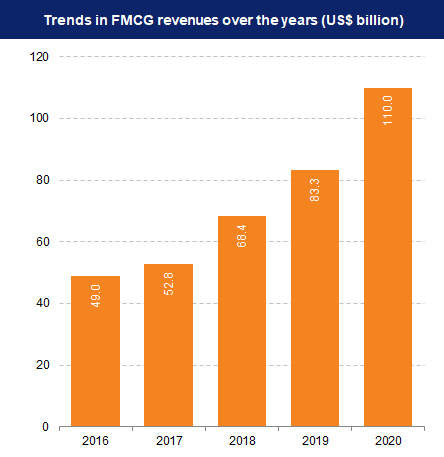FMCG Market: Understanding the Dynamics and Impact on India's Economy
Introduction
The Fast-Moving Consumer Goods (FMCG) industry, also known as the Consumer Packaged Goods (CPG) industry, plays a crucial role in the Indian economy. This sector is responsible for producing, distributing, and marketing a wide range of products that are in high demand, readily available, and reasonably priced. FMCG products are known for their quick turnover due to frequent consumer usage, making them rapidly disappear from store shelves.
In this comprehensive article, we will delve into the various aspects of the FMCG market, its position in India, its impact on the economy, historical development, present scenario, future prospects, major players, India's strategies in this sector, benefits for consumers, and investment opportunities in FMCG stocks.

Most Growing
FMCG sector will be one of the most growing sectors of India
FMCG Market in India: Current Status and Growth Potential:
The FMCG sector in India has witnessed remarkable growth in recent years, driven by several factors. According to the Indian Brand Equity Foundation (IBEF)[1], the Indian food processing market size reached an impressive US$ 307.2 trillion in 2022 and is projected to further grow to US$ 547.3 trillion by 2028, with an estimated compound annual growth rate (CAGR) of 9.5% from 2023 to 2028. This growth can be attributed to the rising disposable income, increasing urbanization, and changing consumer preferences.
Impact on the Indian Economy:
The FMCG sector plays a crucial role in the Indian economy, contributing significantly to employment and GDP growth. This sector provides employment to approximately 3 million people, accounting for about 5% of the total factory employment in the country. The growth of FMCG sales has a direct impact on the overall economic growth of India.
The FMCG industry's contribution to the digital advertising market is substantial, with a 42% share of the total digital spend, expected to reach Rs. 35,809 crore (US$ 4.3 billion) by 2023. This highlights the industry's increasing focus on digital marketing and leveraging the online retail and e-commerce platforms for wider market reach and brand visibility.

Historical Development and Current Position:
The FMCG industry in India has come a long way from being a niche market to one of the key players in the economy. The sector has seen significant growth due to favorable government initiatives, policies, and the growing youth population with rising disposable income. The introduction of new branded products and the penetration of e-commerce platforms have further fueled the growth of the FMCG market.
As of today (2023-08-07), FMCG sales in India are expected to grow at a rate of 7-9% by revenues for the year 2022-23, indicating a robust and steady growth trajectory for the sector.

_________________________________
Major Players in the FMCG Sector
Several major players dominate the FMCG industry in India. These companies have established themselves as trusted brands, catering to the diverse needs and preferences of consumers. Some of the key players include:

India's Strategies in the FMCG Sector:
The Indian government has implemented various policies and schemes to support the growth of the FMCG sector and boost the economy. Some key strategies and initiatives include:
Future Prospects of the FMCG Sector
The future of the FMCG sector in India appears promising, with several key trends and developments shaping its growth. As of 2023, the sector is projected to grow at a CAGR of 14.7% and reach a market size of US$ 220 billion by 2025. The digital transformation and increased online shopping trends have also impacted the FMCG industry, leading to a surge in digital marketplace adoption and online retail sales.
Benefits for Consumers and Investors
The growth of the FMCG sector in India presents numerous benefits for consumers and investors alike. For consumers, the availability of a wide range of quality products at competitive prices ensures greater convenience and satisfaction. Additionally, the rise of eco-friendly and socially responsible brands addresses the growing concerns about the environment and sustainability.
Investors have the opportunity to tap into the potential of the FMCG market and benefit from its consistent growth. Several FMCG companies have made strategic investments in promising startups, diversifying their portfolios and gaining a competitive edge in the market.
FMCG Stocks: An Attractive Investment Option
Investing in FMCG stocks can be a wise choice for investors looking for stable and long-term returns. The FMCG sector's steady growth and its role as a major contributor to India's economy make it an attractive option for those seeking to diversify their investment portfolios.

Conclusion
The FMCG sector in India has emerged as a key player in the country's economy, driven by factors such as rising disposable income, urbanization, and digitalization. The industry's growth prospects look promising, with an expected CAGR of 14.7% and a market size of US$ 220 billion by 2025. Major players like ITC, Hindustan Unilever, Nestlé, and others continue to dominate the market, while the government's supportive policies and initiatives fuel its expansion.
Investors looking for stable and rewarding investment options can consider FMCG stocks, benefiting from the sector's consistent growth and contribution to India's economic development.
Get Our Digital Marketing services
ServicesWritten By: Deepak Yadav
Date: 06 August 2023
Powered by: Angelic Valley
